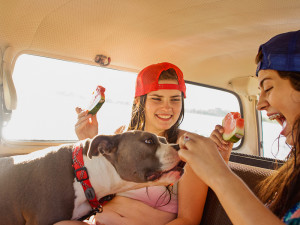Can Dogs Eat Yogurt?
Yes, yogurt is a safe and healthy treat for dogs.

Share Article
Yes, yogurt is a wonder food packed with probiotics, protein, calcium, B-12, and other nutrients, and is safe for cats to eat.
Nutrition facts: Is yogurt good for dogs?
Yogurt has many benefits for dogs. Some health benefits include aiding digestion, easing diarrhea, and boosting immunity, and it’s often easier to digest for dogs than other dairies because it contains less lactose.
Yogurt is a good source of protein, calcium, phosphorus, B-12, and riboflavin. The protein within yogurt comes in two forms: whey and casein. Whey protein is considered a complete protein containing all nine essential amino acids and low lactose content. Yogurt also has friendly live bacterial cultures (probiotics), which provide many digestive health benefits.
Yogurt can be helpful for some dogs to resolve minor GI problems. If your dog has a tummy ache, a bit of yogurt can help them get back to normal. For minor stomach upsets, vets will often recommend fasting — feeding only white rice — for a short period of time to help restore your dog’s normal gastrointestinal flora. “Try white rice (one cup), chicken baby food (one jar), and yogurt (1 tbsp) several times daily,” says veterinarian Dr. Greg Martinez in his discussion of diarrhea in dogs.

The latest research shows a huge connection between gut bacteria and the health of the rest of the body. Studies show that keeping the GI microflora in balance can help with:
Allergies
Boosting immune system
Behavioral problems
Colon cancer
Inflammation
Obesity
Some yogurts are healthier than others, but all forms of yogurt are made by the bacterial fermentation of milk, and the best yogurts, contain live “cultures” (friendly bacteria). These micro-organisms can help keep gut bacteria in balance.
Can dogs eat yogurt treats?
Yes, dogs can eat treats with yogurt in them. Or, to try incorporate this superfood into your pup’s diet, try adding a dollop of yogurt to your pup’s kibble as a topping, give them a frozen yogurt treat, or use it to disguise their medication. Yogurt can also be used to ease separation anxiety or keep pups busy by using plain yogurt (along with some peanut butter and kibble) as a kong stuffer. Just remember that treats should make up no more than 10 percent of your dog’s daily calories, so keep an eye on the calorie counts with this high-calorie food.
Is yogurt completely safe for dogs?
Because yogurt is a high-fat food, the benefits of active cultures may be limited for dogs (some vets recommend using supplements instead). In his book The Dog Diet, Dr. Martinez says, “I used to recommend yogurt for probiotic effects but found that most yogurt has low levels of bacteria and may be less effective than the probiotic power of capsules.”
While yogurt has plenty of nutritional benefits for your dog, there are also a few worries to watch out for. Lactose-intolerant dogs may not handle yogurt well. And some yogurts have additives that are toxic to dogs. Yikes. So, how do you know what yogurt is okay for dogs?
The best yogurt for your dog is simple plain yogurt. Serving your dog plain yogurt ensures they aren’t exposed to unnecessary additives, sugars, or dangerous sweeteners. But because not all yogurts have the same ingredients, it’s best to check the label. For dogs, the best yogurt includes:
No flavors
Unsweetened
No additives
No xylitol (sometimes called birch sugar)
Low-fat
Active live cultures
Dogs can eat Greek yogurt, too. Greek yogurt is considered healthier than standard yogurt because it contains more of those beneficial live cultures. While both Greek yogurt and regular yogurt are made from the same basic ingredient (milk), Greek yogurt is thicker, creamier, contains less sugar, and has more protein. Dogs that are lactose intolerance and may not be able to enjoy regular yogurt might try Greek yogurt, which has lower levels of lactose.
Two common kinds of yogurt, fruit-flavored and vanilla, are also not recommended for dogs. Dogs shouldn’t eat strawberry yogurt, or other store-bought fruit yogurts, because they contain excess sugars (or toxic artificial sugar). Likewise, vanilla yogurt also contains too much sugar for dogs. For a healthier option, pair fresh fruit, like blueberries or strawberries, with plain regular yogurt or plain Greek yogurt.
What other foods are safe for dogs?
Honey: The antibacterial, immunity-boosting, and antioxidant properties found in honeyopens in new tab can be beneficial for your dog.
Eggs: Eggs can be a good source of proteinopens in new tab for your dog.
Cheese: Because of its high-protein content, cheese is a safe treatopens in new tab to give your dog.
What foods are dangerous for dogs?
Chocolate: Under no circumstanceopens in new tab should chocolate be given into your dog.
Mashed potatoes: Mashed potatoes might be your comfort foodopens in new tab, but they can be toxic for your pup.
Ice cream: A summertime favorite for humans, ice cream’s lack of nutritional content for dogs means it should be avoided as a regular treat. Dog-safe ice cream is OK in moderation, though ice cream meant for humans could contain toxic ingredients, so stay away from that.
The bottom line: Can dogs eat human foods?
Many human foods, like yogurt, are safe for dogs to eat in moderation. Like all treats, though, yogurt should be supplementary to a complete and balanced dog food diet.
Dogs can have other forms of dairy, too, like cheese, milk, cottage cheese, and ice cream in moderation. Cheese is a very popular high-value dog training treat. Cutting up cheese into tiny bite-sized pieces makes for an excellent and super rewarding reinforcement for dogs, but beware, cheese is also high in fat. It’s best to give cheese to your dog only in moderation, and use alternative treats for the bulk of your dog training (otherwise, your dog will likely suffer an upset stomach).
Some dogs with a sensitive stomach or lactose intolerance may experience stomachaches and diarrhea after eating any amount of dairy products like milk or cheese, which have higher lactose levels. As with any new food, introduce dairy products to your dog slowly and in small quantities. You might find that your dog doesn’t like the smell or taste — not all dogs do — or they may be lactose intolerant. To be safe, contact your vet before making significant dietary changes or before introducing new foods.
FAQs (People also ask):
Is it okay to give dogs yogurt?
Yes, dogs can eat yogurt, but only in moderation due to its high fat content.
How much yogurt can a dog eat?
Dogs can eat yogurt in small amounts, such as a treat or to help resolve minor GI problems.
Is yogurt safe for dogs?
Plain yogurt, including plain Greek yogurt, is safe for dogs. Flavored yogurts, such as fruit yogurts and vanilla yogurt, are not good for dogs due to their high sugar content, and should be avoided. Dogs that are lactose intolerant should avoid all varieties of yogurt.
Why do dogs like yogurt?
Dogs like yogurt for the same reason they like other dairy products such as cheese and milk: they are high in fat and taste delicious!
Is yogurt healthy for dogs?
Yes, plain yogurt can be healthy for dogs. Yogurt contains protein, calcium, phosphorus, B-12 vitamin, and riboflavin, as well as active cultures and probiotics that can aid your dog’s digestion.
References

Daniela Lopez
Daniela Lopez is a digital media specialist and long-time contributor to The Bark.
Related articles
![Man crouching down to let two dogs eat out of a bowl]()
How Many Treats Is Too Many?
The key to curbing mindless snacking — this is for your dog.
![A person giving a banana to a dog.]()
10 Fruits and Vegetables That Your Dog Can Feast On
Indulge your pup (safely) with these delicious and healthy snacks.
![Side view of a cute hungry dog standing next to a red bowl with food in a studio with white background]()
How to Get a Dog to Eat
You can’t appease your picky new dog with chicken nuggets like you can with your toddler. Here are some things you can do.
![Teenagers Feeding a Dog Watermelon While Sitting In Car On a Sunny Day]()
9 Healthy Summer Snacks to Share With Your Dog
Your pup wants in on your crudité platter.




